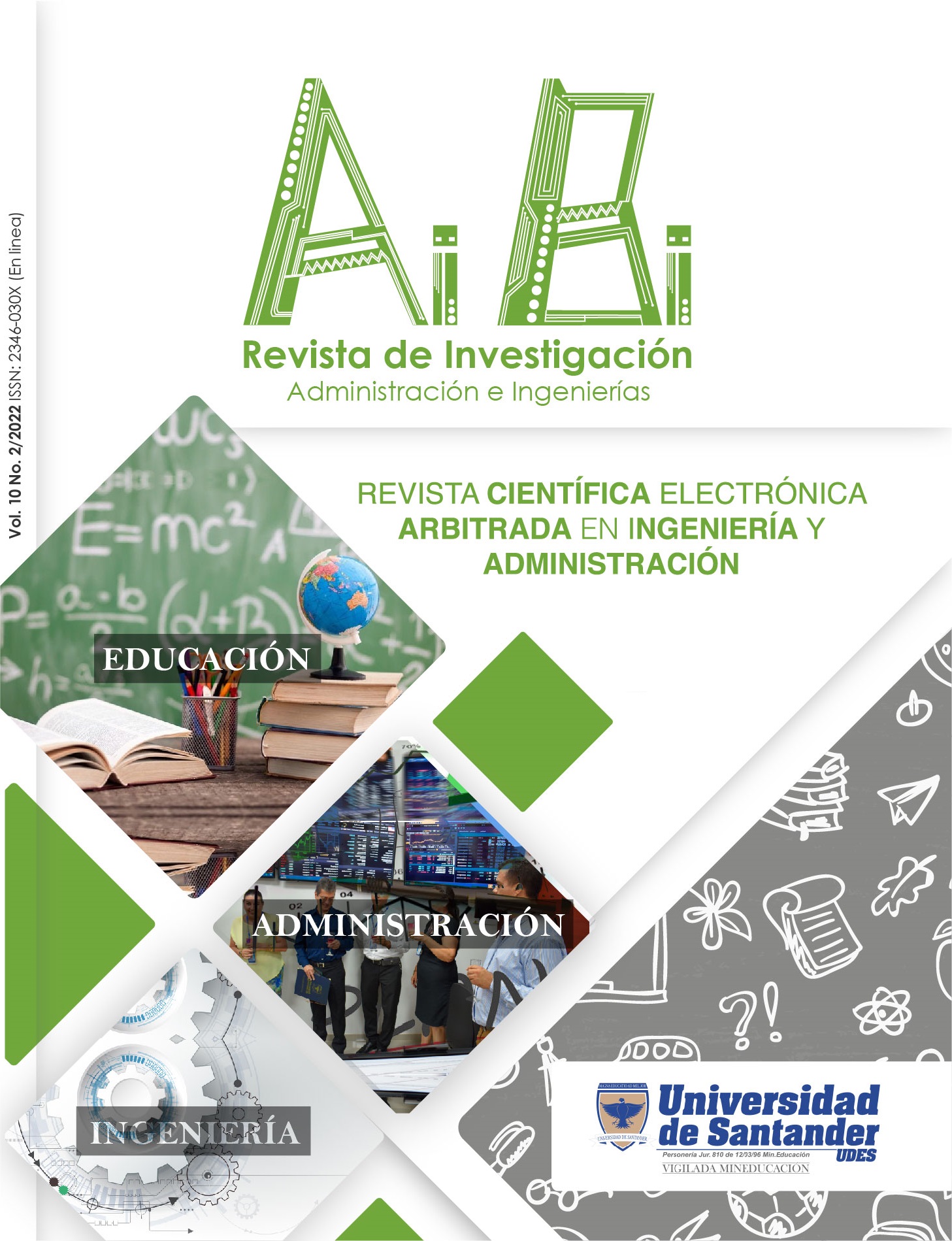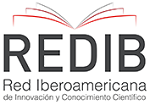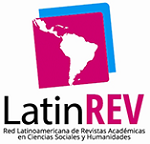Educational innovation: Methodological guide for the production engineering course case study Industrial Engineering program
DOI:
https://doi.org/10.15649/2346030X.2769Keywords:
innovation, production, manufacturing, education, methodological guideAbstract
The educational processes must be in constant continuous improvement, supported by innovation actions that allow understanding the environment, in order to generate actions that impact society, in this research whose objective was to propose a methodology for the development of the formative practice of the production engineering course as educational innovation strategies, it was supported in a descriptive and field methodology structure, the data collection was done through different instruments and the result of the guide was based on analysis of bibliographic information regarding the course; The results obtained showed how the course is structured and what aspects are handled from the theoretical point of view, both at a national and international level; a diagnosis of the manufacturing sector was made, showing problems in terms of its productive structure; according to the micro curriculum of the course, a new thematic scheme was established on which the guide to be developed was based, and upon validating its application, it was shown that the guide developed was in accordance with the needs of the sector, since both students and businessmen approved its functionality.
References
E. S. Hung y J.V. Cobos, “La promoción de experiencias de innovación educativa en TIC en los centros escolares”, Caso región Caribe colombiana, September, 2017. [En línea]. Disponible: https://doi.org/10.4067/S0718-07052017000100026
J.P. Medina y A. Navío, “Concepciones sobre innovación educativa. ¿Qué significa para los docentes en chile?”, 2018. March 2019. [En línea]. Disponible: https://doi.org/10.30827/profesorado.v22i4.8395
F.J. Garcia, “Mapa de tendencias en Innovación Educativa”, Education in the Knowledge Society (EKS), 16(4), 6, 2015. [En línea]. Disponible: https://doi.org/10.14201/eks2015164623
M. Martín, “Two centuries of educational innovation in spain.. alternative pedagogies: Are they neo or retro?”, New Educational Review, 63, 49–58. 2021. [En línea]. Disponible: https://doi.org/10.15804/tner.2021.63.1.04
J.M. Lavín, G. Naranjo-López, J.E. Balarezo-López, y V.H. Molina-Dueñas, “Innovación Frente al Nuevo Paradigma en las Universidades Ecuatorianas: la Experiencia de la Universidad Técnica de Ambato”, CISCI 2017 - Decima Sexta Conferencia Iberoamericana En Sistemas, Cibernetica e Informatica, Decimo Cuarto Simposium Iberoamericano En Educacion, Cibernetica e Informatica, SIECI 2017 - Memorias, July, 24–29. 2017.
A. Muñoz, a. (n.d.), “Estrategias para una innovacion educativa Mediante El Empleo De Las Tic”, Revista Latino Americana de Tecnologia Educativa, 2, 42–50. [En línea]. Disponible: http://dehesa.unex.es:8080/xmlui/bitstream/handle/10662/1880/1695-288X_2_1_41.pdf?sequence=1
C. Flórez, A.D.P. Mayorga y L.M. Vargas, “La práctica formativa como escenario de aprendizaje significativo del cuidado de enfermería”, Revista Colombiana de Enfermería, 12(14), 93, [En línea]. Disponible: 2017.https://doi.org/10.18270/rce.v14i.2031
M. Pachecho,”Educación y formación para el trabajo: inclusión social , productiva y económica”, Education and working skills: productive, economic and social inclusion, Páginas De Seguridad Social, 1, 167–210. 2017.
P.S. Aithal y S. Aithal, “Buil lding W World d-Clas s Univ versiti es : So me In nsights s ctions”, August, 13–35, 2019. [En línea]. Disponible: https://doi.org/10.5281/zenodo.3377097
H. Hubball, M. Pearson, A. Clarke, “Teaching and Learning Inquiry: The ISSOTL Journal”, Indiana University Press, volume 1, pp. 41-57, 2013. [En línea]. Disponible: https://muse.jhu.edu/article/504198
A. Zabala y L. Arnau, “Métodos para la enseñanza de las competencias”, (Barcelona, Grao), 208 pp. 2014. [En línea]. Disponible: https://books.google.com.co/books?id=x4AQogEACAAJ&printsec=frontcover&hl=es&source=gbs_ge_summary_r&cad=0#v=onepage&q&f=false.
R. Hernandez, C. Fernandez y M. del P. Baptista, “Metodologia de la investigacion”. 2010.
J. Hurtado, “EL PROYECTO DE INVESTIGACION”, 2015.
M. Balestrini, ”Como se elabora el proyecto de investigación”, (BL Consul.), 2006.
J.M. Vélez-Restrepo, P.N. Benjumea-Hernández, K.J. Castro Peláez y D.C. Ríos-Echeverri, “Estrategia de Innovación en Educación en Ingeniería”, 1–62, 2017.
A. Fernandez, “Metodologías activas para la formación de competencias”, Educatio Siglo XXI, 24(24), 35–56, 2006.
K. Castro, D. López y J. Vélez, “Evolución de la Estrategia de Aprendizaje Basado en Proyectos y Problemas al Instituto de Educación en Ingeniería de la Facultad de Minas en busca de una Ingeniería para la Vida”, MEMORIAS ACOFI - Retos En La Formación de Ingenieros En La Era Digital, 226, 2019.
M. Orozco, Y. Orrego y J. Villareal, “Instrumentos de evaluación de competencias profesionales en estudiantes universitarios”, Estado del arte. In Innovación educativa, estrategias de aprendizaje y competencias en educación (Issue 203, pp. 52–73), 2017. [En línea]. Disponible: https://doi.org/10.36737/01230425.v0.n33.2017.1644
X. Zhang, Y. Ma, Z. Jiang, S. Chandrasekaran, Y. Wang y R.F. Fofou, “Application of design-based learning and outcome-based education in basic industrial engineering teaching: A new teaching method”, Sustainability (Switzerland), 13(5), 1–23, 2021. [En línea]. Disponible: https://doi.org/10.3390/su13052632
S. Sudiyatno, A. Nuryanto, A. S. Sutopo y M. Nashir “Model of university-industry collaboration to support internship program in Engineering Faculty of Universitas Negeri Yogyakarta Model of university-industry collaboration to support internship program in Engineering Faculty of Universitas Negeri Yogyakar”, 0–5. 2020. [En línea]. Disponible: https://doi.org/10.1088/1742-6596/1700/1/012028
H. Feng, L. Ru-ru, S. Zuo, y Q.Y. Wang, “Research on Talents Training Mode of Local Applied Undergraduate Universities under the Background of New Engineering Research on Talents Training Mode of Local Applied Undergraduate Universities under the Background of New Engineering”, 2020. [En línea]. Disponible: https://doi.org/10.1088/1757-899X/768/5/052001.
Downloads
Published
How to Cite
Downloads
Issue
Section
License
The journal offers open access under a Creative Commons Attibution License

This work is under license Creative Commons Attribution (CC BY 4.0).









